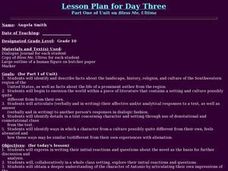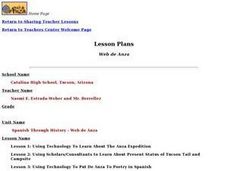Curated OER
30 Day Journal
Young scholars collect articles, political cartoons, photographs and other artifacts relating to a specific traumatic event, such as September 11th. They reflect on their artifacts in written journals.
Curated OER
Bless Me, Ultima: Dialogue Journals
Tenth graders read Chapter 1 of the novel "Bless Me, Ultima" and respond to the text. They answer and ask questions and record their impressions of different aspects of the book in a dialogue journal format with a partner. Students...
Curated OER
When the Personal Becomes Presidential
Students explore American voter's attitudes toward the checkered pasts of presidents and presidential candidates. They create and conduct a survey of members of their school community and analyze the results.
Curated OER
Who Am I?
Students create a graphic timeline depicting who they are, where they've been and where they think they are going in their lives. They analyze and reflect upon the important events of their lives, and then use this as a starting point...
Curated OER
Milk and Monarch Butterfly Mania Journal Entry
In this milk and monarch butterfly mania journal entry worksheet, students write a scientific journal entry about the milkweed plant, using the information from another linked website. This worksheet includes many links to other web...
Curated OER
- Making Metaphors with Munchies
Students brainstorm independently first, then ask their best friend on the team, or seat partners, depending on the year & student mix, to add to their list of personal characteristics and/or to name three words they think of...
Curated OER
Level Two ITIP (DM)
Students, while working in groups, recognize how to use a decision making process to make positive and healthy decisions concerning health issues. They brainstorm reasons for choosing drugs, witness a decision making power point and...
Curated OER
Blogging
A fun, modern twist on journaling! Instead of responding to prompts in their composition notebook, writers use the Internet to complete blog entries. A sample blog (with prompts) is shown here, and writers are assessed on conventions and...
Curated OER
Introduce Vocabulary: Kindergarten Count to 100
During read-aloud of Kindergarten Count to 100 by Jacqueline Rogers, children listen for context clues about vocabulary that includes the words "first," "second," and "third." I love the way vocabulary development skills are integrated...
Teaching Tolerance
Tweeting for Change
Do some good with social media. Secondary scholars participate in a live Twitter chat focusing on social justice issues. The thought-provoking activity allows academics to set up a live chat, create responses, and express their personal...
Curated OER
Poetry and Hip Hop
High schoolers compare and contrast the genres of poetry and hip-hop. They view a poetry slam and write about it in their journals. Learners view a Lauryn Hill music video and respond to it in their journals. They compare and contrast...
Curated OER
Perspectives on September 11,2001
Fifth graders will learn about various perspectives around events. They will need to take on the perspectives of various key people during the September 11 attack. Then they will write in their journals about the incident. They read...
Curated OER
Bronze Bow
Explore ancient Rome through reading The Bronze Bow by Elizabeth George Speare. Readers activate prior knowledge by examining objects that relate to the story and predict the significance of the items. Their curiosity is aroused through...
Curated OER
From A Different Perspective
Emerging writers create a response to their reading. They read Notes from the Trail and discuss whose perspective the journal entry is written from. Then, they write a response to the journal entry in first person perspective as if they...
Curated OER
Chivalry: Dead or Alive?
Students identify behaviors which may be considered chivalrous and provide a definition of what chivalry entails. They articulate their views about chivalrous behavior identify times in which they have acted in a chivalrous manner.and...
Curated OER
Using Primary Sources: Letters from the Presidents
Students find out about the minds and thoughts of presidents through reading their actual letters. They explore the personal lives of presidents. They answer questions about a primary source. They write essays.
Curated OER
Spanish Through History - Web de Anza
Students examine the history, economics, and geography of the Anza era. They read primary source journals, diaries, and letters, conduct Internet research, and write a research report.
Curated OER
Survivors
Seventh graders explain their understanding of their strength and how it is helpful in a group situation. They also complete graphic organizers by writing at least four of their own personal strengths. Students write about their...
Curated OER
Character Traits - Who are We?
Sixth graders examine character traits. In this character education lesson, 6th graders set goals to strengthen particular personal character traits. Students watch their instructor model the character trait journaling strategy prior to...
Curated OER
Overland Trails To The West
Consider the political, physical, and geographical factors that led to and marked the Westward Expansion. Learners will track the various routes developed during the 1800's. They create a first person journal describing what they see,...
Curated OER
Magical Maps
Second graders discuss the importance of using maps and how they are used. After they listen to a folktale, they develop their own story line maps and write their own folktale to accompany a map. They also identify and locate the seven...
Curated OER
Civil War Diaries
Fifth graders examine excerpts from a diary of a Confederate soldier and his experiences in a Union prison camp. After receiving character cards, they write diary entries from the perspectives of their Civil War identity. As an...
Curated OER
Explaining Factors Causing Conflict and Cooperation
Young scholars discuss what causes conflicts amongst groups especially pertaining to Native American tribes. In this conflicts lesson plan, students have discussion questions that they verbally answer and write in a journal.
Curated OER
Avoir, Être, et Le Passé Composé
The instructional activity begins with direct instruction: how and when do we use avoir and être to form the past tense? After identifying the verbs that use either avoir or être, French learners write about five things they did the week...

























